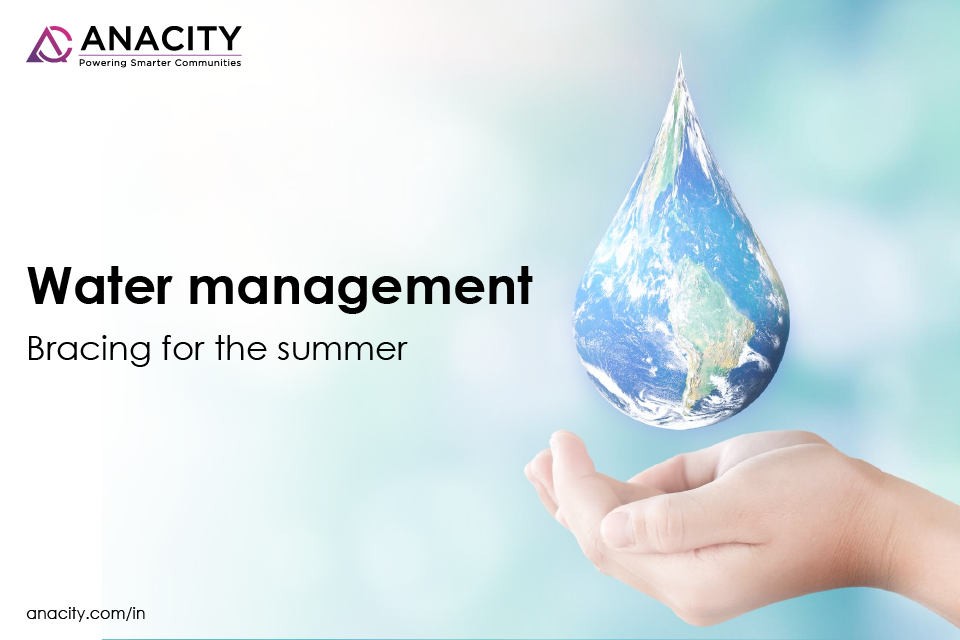Water Management – 3 Key Steps for Every Gated Community
Water Management ANACITY, Apartment Management, tracking water use, water tankers, water treatmentAs India rapidly urbanises with new real estate developments changing the landscape, water scarcity has become one of the biggest challenges for urban planners. It peaks as the mercury rises every summer. This scarcity often leads to a renewed focus on water management and increasing costs for housing societies that have to organise water tankers.
The recent developments have again brought into focus the importance of water conservation by management committees and community managers. With rising costs and increasing restrictions, such as the Karnataka government seizing water tankers, more and more communities are striving for water sufficiency. This article explores how this objective can be achieved.
Water management: Follow the 3Rs
Like any resource management strategy, water conservation must start with the old rule of 3 Rs – reduce, reuse, and recycle.
Tracking & reducing water consumption
The first step in water management is to reduce consumption at both the community and individual apartment levels. Many Management Committees are already actively cutting down their usage by reducing wastage and limiting water-intensive deep cleaning.
However, the success of any water conservation strategy lies in enforcing a strict policy at the individual level. Most Management Committees struggle to break existing patterns among their residents. Some of the common measures here include:
- Check plumbing for leaks
- Installing flow restrictors on taps and shower heads
- Switching showers for bucket baths
- Turning off water while brushing teeth or shaving.
- Reducing washing machine usage
- Mopping every alternate day or less frequently
Reusing water
Urban India generates 72,368 million litres of wastewater every day of which only 28% is treated and reused. The rest of the untreated wastewater flows freely into the groundwater where it acts as a pollutant. However, a recent report suggests that 80% of the wastewater can be treated and reused for non-potable purposes. Many residential societies are currently reusing STP-treated wastewater to optimise their water management.
In Bangalore, many gated communities have come up with even more innovative solutions to reuse water after the Bangalore Water Supply and Sewerage Board issued an order to stop the use of drinking water for non-potable purposes. One society collected RO wastewater from each flat for mopping common areas and washing cars. Meanwhile, some residential complexes are also contemplating tying up with water treatment companies to convert the treated water for potable uses, including topping up their swimming pools.
Recycle with rainwater harvesting
Quite often our cities move from floods to famines. Rainwater harvesting (RWH) allows us to utilise naturally available rainwater, thus reducing dependence on external sources like tankers. Find out more in our article Drinking, Cooking, Cooling, & Disaster Management: How Rainwater Harvesting is Promoting Water-Sufficiency. In fact, post-2021 RWH is mandatory for all new buildings with a roof area exceeding 100 square meters.
However, the design and capacity of the RWH plant is crucial in ensuring self-sufficiency. Find out more about why your RWH may seem insufficient in our article Is Your Society Still Dependent on Tankers? Blame it on Outdated Rainwater Harvesting. Read Is your Rainwater Harvesting Falling Short? Here’s Why to know more about common mistakes in installing RWH systems.
If you are unsure about the way forward, check our article Conventional Or Design-Based RWH? Find out What Works Best for You.
How ANACITY helps
ANACITY offers the following two important features in improving water management:
Resolving plumbing issues:
One leaky faucet may not seem like much, but it can amount to precious litres in just a couple of hours. This can seem even more wasteful when we add up all such leaks in a community. Hence, it is critical that all plumbing issues, especially leaks, are addressed immediately.
ANACITY’s complaint management module offers residents a platform to register plumbing issues. The platform includes an escalation matrix where unaddressed complaints are moved to the next supervisory level. Thus, every resolution can be tracked and addressed in time.
The ERP also includes root-cause analysis that helps community managers trace the origin of persistent issues. Society admins can leverage the issue to improve the overall plumbing and water conservation efforts.
Metered utility
This feature is designed to centralise meter readings. Admins can collect meter readings of individual flats, raise a single invoice, and thus, streamline payments. This feature can also be used to track usage for every unit, helping admins to identify units with high consumption. This tool can be leveraged to build accountability.
